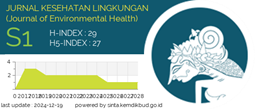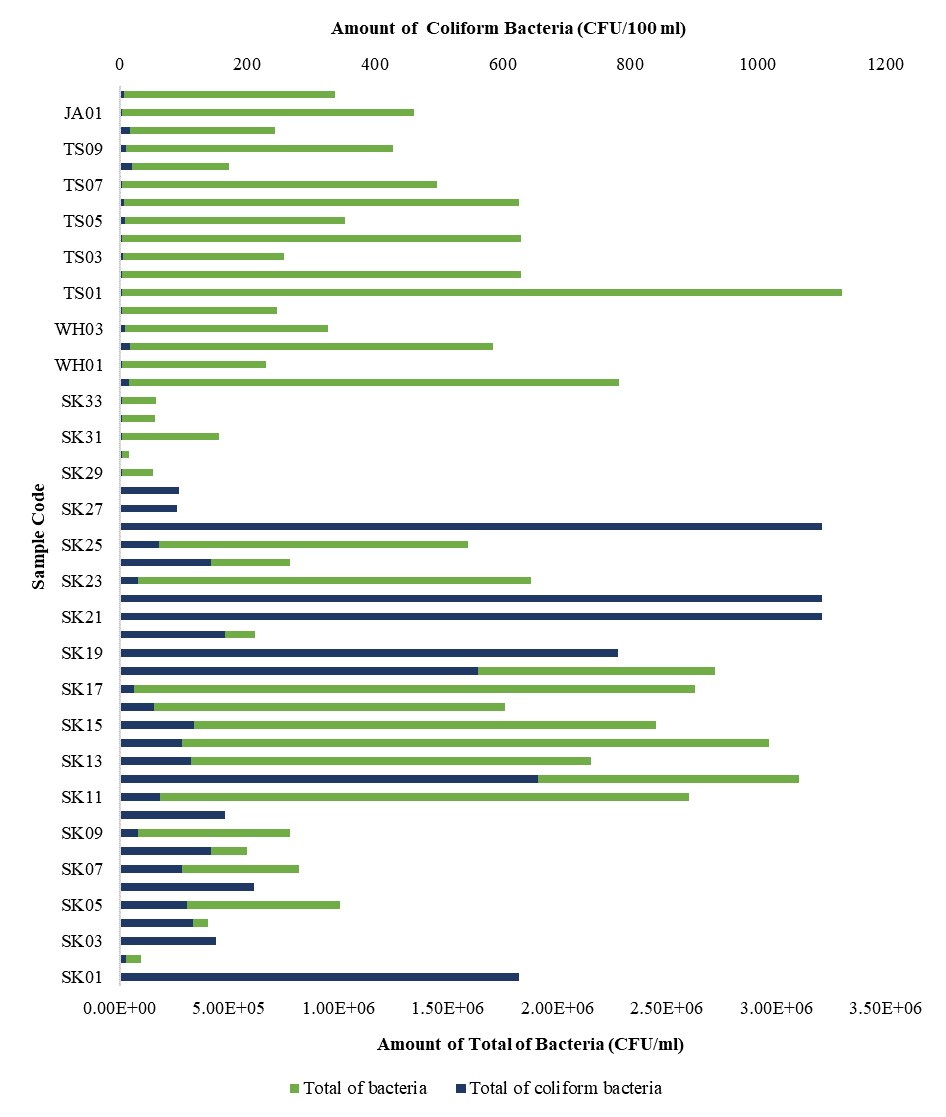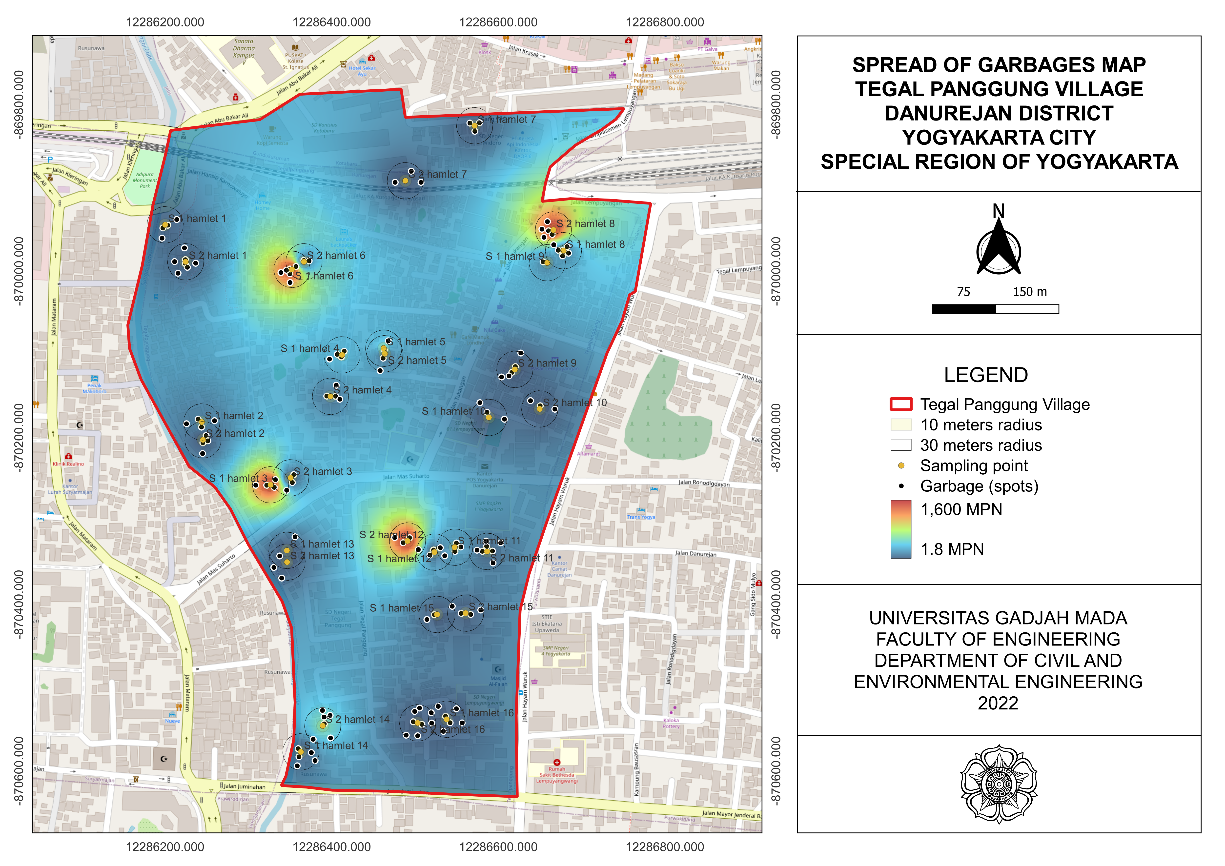HOUSEHOLD FOOD WASTE POLICY: A LITERATURE REVIEW

Introduction: Food waste (FW) is a serious problem and significantly impacts the environment, economy, and social. Globally, the average FW reaches 121 kg/ capita/year, and households are the main contributors to FW. Several countries have implemented various strategies to prevent household FW. This review aims to explore the household FW prevention policies and their potential to be implemented in Indonesia. Discussion: Three strategies have been widely applied worldwide, including economic incentives, regulations, as well as FW awareness and behavior campaigns. In this case, the economic incentives include landfill tax, incineration tax, and Pay-As-You-Throw (PAYT). Many laws and regulations have been implemented related to waste management, food, economics, and those regulations are either directly or indirectly related to FW. The awareness and behavior change campaign is the most widely applied strategy to prevent household FW globally. Conclusion: Well-designed policies and regulations supported by education and awareness campaigns are the potential strategies for household food waste reduction and prevention in Indonesia.
United Nations Environment Programme. Food Waste Index Report 2021. Nairobi: United Nations Environment Programme; 2021. https://www.unep.org/resources/report/unep-food-waste-indexreport-2021
Ministry of National Development Planning/Bappenas. Study Report Food Loss and Waste in Indonesia Supporting the Implementation of Circular Economy and Low Carbon Development. Jakarta: Ministry of National Development Planning/ Bappenas; 2021. https://lcdi-indonesia.id/wpcontent/uploads/2021/07/Report-Kajian-FLW-ENG.pdf
Gustavsson J, Cederberg C, Sonesson U, van Otterdijk R, Meybeck A. Global Food Losses and Food Waste. Extent, Causes and Prevention. Rome: Food and Agriculture Organization; 2011. https://www.fao.org/3/i2697e/i2697e.pdf
Bellù LG. Food Losses and Waste. Issues and Policy Options. Rome: Food and Agriculture Organization; 2018. https://www.fao.org/3/ca1431en/CA1431EN.pdf
Food and Agriculture Organization. The State of Food Security and Nutrition in the World 2020. Transforming Food Systems for Affordable Healthy Diets. Rome: Food and Agriculture Organization; 2020. 1–320 p. http://www.fao.org/3/ca9692en/ca9692en.pdf
Food and Agriculture Organization. Food Wastage Footprint: Full Cost-Accounting. Final Report. Rome: Food and Agriculture Organization; 2014. https://www.fao.org/3/i3991e/i3991e.pdf
Chen C, Chaudhary A, Mathys A. Nutritional and Environmental Losses Embedded in Global Food Waste. Resour Conserv Recycl. 2020;160(104912):1-12. https://doi.org/10.1016/j.resconrec.2020.104912
Baig MB, Al-Zahrani KH, Schneider F, Straquadine GS, Mourad M. Food Waste Posing a Serious Threat to Sustainability in The Kingdom of Saudi Arabia - A Systematic Review. Saudi J Biol Sci. 2019;26(7):1743–1752. https://doi.org/10.1016/j.sjbs.2018.06.004
Food and Agriculture Organization. Food Wastage Footprint & Climate Change. Rome: Food and Agriculture Organization; 2015. http://www.fao.org/3/a-bb144e.pdf
Sanchez LJ, Caldeira C, Laurentiis VD, Sala S. Brief on Food Waste in The European Union. Italy; 2020. https://www.researchgate.net/publication/343879091_Brief_on_food_waste_in_the_European_Union
Philippidis G, Sartori M, Ferrari E, M'Barek R. Waste Not, Want Not: A Bio-Economic Impact Assessment of Household Food Waste Reductions in The EU. Resour Conserv Recycl. 2019;146(1):514–522. https://doi.org/10.1016/j.resconrec.2019.04.016
Slorach PC, Jeswani HK, Cuéllar-Franca R, Azapagic A. Assessing The Economic and Environmental Sustainability of Household Food Waste Management in The UK: Current Situation and Future Scenarios. Sci Total Environ. 2020;710(135580):1-15. https://doi.org/10.1016/j.scitotenv.2019.135580
Schott ABS, Andersson T. Food Waste Minimization from a Life-Cycle Perspective. J Environ Manage. 2015;147(1):219–226. https://www.sciencedirect.com/science/article/pii/S0301479714004289
Blas A, Garrido A, Willaarts B. Food Consumption and Waste in Spanish Households: Water Implications Within and Beyond National Borders. Ecol Indic. 2018;89(1):290–300. https://doi.org/10.1016/j.ecolind.2018.01.057
Food and Agriculture Organization. Food Losses and Waste in the Context of Sustainable Food Systems. A Report by the High Level Panel of Experts on Food Security and Nutrition of the Committee on World Food Security. Rome: Food and Agriculture Organization; 2014. http://www.fao.org/3/a-i3901e.pdf
6. Morlok J, Schoenberger H, Styles D, GalvezMartos J-L, Zeschmar-Lahl B. The Impact of PayAs-You-Throw Schemes on Municipal Solid Waste Management: The Exemplar Case of the County of Aschaffnburg, Germany. Resources. 2017;6(1):1-16. https://doi.org/10.3390/resources6010008
Magrini C, D'Addato F, Bonoli A. Municipal Solid Waste Prevention: A Review of Market-Based Instruments in Six European Union Countries. Waste Manag Res. 2020;38(1_suppl):3–22. https://doi.org/10.1177/0734242X19894622
Gradus R, Homsy GC, Liao L, Warner ME. Which US Municipalities Adopt Pay-As-You-Throw and Curbside Recycling?. Resour Conserv Recycl. 2019;143(1):178–183. https://doi.org/10.1016/j.resconrec.2018.12.012
Cho I, Kang M. Sustainable Development Goals Policy Brief Series No 3. Comprehensive Study of Waste Management Policies & Practices in Korea and Recommendations for LDCs and MICs. Seoul: United Nations Development Programme; 2017. https://www.undp.org/content/dam/uspc/docs/USCP policybriefno4.pdf
van der Werf P, Larsen K, Seabrook JA, Gilliland J. How Neighbourhood Food Environments and a Pay-as-You-Throw (PAYT) Waste Program Impact Household Food Waste Disposal in the City of Toronto. Sustainability. 2020;12(17):7106. https://doi.org/10.3390/su12177016
Park S. Factors Inflencing the Recycling Rate Under the Volume-Based Waste Fee System in South Korea. Waste Manag. 2018;74(1):43–51. https://doi.org/10.1016/j.wasman.2018.01.008
Ukkonen A, Sahimaa O. Weight-Based Pay-AsYou-Throw Pricing Model: Encouraging Sorting in Households Through Waste Fees. Waste Manag. 2021;135(1):372–380. https://doi.org/10.1016/j.wasman.2021.09.011
Yu K. Pay As You Throw System of Seoul. Seoul: Seoul Solution; 2017. https://seoulsolution.kr/en/node/6326
Department for Environment Food and Rural Affirs. Waste Prevention Programme. Summary of Existing Measures. London: Department for Environment Food and Rural Affirs; 2013. https://www.gov.uk/government/uploads/system/uploads/attachment_data/file/264904/pb14093-wppmeasures-list-20131211.pdf
Sahlin J, Ekvall T, Bisaillon M, Sundberg J. Introduction of A Waste Incineration Tax: Effcts on The Swedish Waste Flows. Resour Conserv Recycl. 2007;51(4):827–846. https://doi.org/10.1016/j.resconrec.2007.01.002
ECOTEC Research & Consulting. Study on Environmental Taxes and Charges in the EU. Brussels: ECOTEC Research & Consulting; 2001. https://ec.europa.eu/environment/enveco/taxation/pdf/ch10_landfil.pdf
Wardana AB, Safira DA. Efektifkah Landfil Tax? Sebuah Tinjauan. J Pajak Indones. 2020;4(2):1–13. https://jurnal.pknstan.ac.id/index.php/JPI/article/download/1741/900
Krizanic F, Oplotnik Ž, Mencinger J, Brezovnik B. The Inflence of Ecological Taxes on the Exposure of Waste and CO
Emissions in A Selected Group of EU Countries. J Comp Polit. 2019;12(2):38–49. http://www.jofcp.org/assets/jcp/JCP-July-2019.pdf
Chalak A, Abou-Daher C, Chaaban J, Abiad MG. The Global Economic and Regulatory Determinants of Household Food Waste Generation: A CrossCountry Analysis. Waste Manag. 2016;48(1):418–422. https://doi.org/10.1016/j.wasman.2015.11.040
Schanes K, Dobernig K, Gözet B. Food Waste Matters - A Systematic Review of Household Food Waste Practices and Their Policy Implications. J Clean Prod. 2018;182(1):978–991. https://doi.org/10.1016/j.jclepro.2018.02.030
Takata M, Fukushima K, Kino-Kimata N, Nagao N, Niwa C, Toda T. The Effcts of Recycling Loops in Food Waste Management in Japan: Based in The Environmental and Economic Evaluation of Food Recycling. Sci Total Environ. 2012;432(1):309–317. https://doi.org/10.1016/j.scitotenv.2012.05.049
Marra F. Fighting Food Loss and Food Waste in Japan. Leiden: Leiden University; 2013. http://www.fao.org/fileadmin/user_upload/save-food/PDF/FFLFW_in_Japan.pdf
Eubanks LB. From a Culture of Food Waste to a Culture of Food Security: A Comparison of Food Waste Law and Policy in France and in the United States. William Mary Environ Law Policy Rev. 2019;43(2):667-687. https://scholarship.law.wm.edu/wmelpr/vol43/iss2/8
Condamine P. France's Food Waste Prevention Legislation Law for Fighting Food Waste. Brussels: Zero Waste Europe; 2020. https://zerowasteeurope.eu/wp-content/uploads/2020/11/zwe_11_2020_factsheet_france_en.pdf
Johnsen DE. Preemptive Effct of the Bill Emerson Good Samaritan Food Donation Act, Opinions of the Offi of Legal Counsel in Volume 21. United States: Attorney General Offi of Legal Counsel; 1997. http://www.justice.gov/olc/bressman.htm
Public Health Law Center. Liability Protection for Food Donation. Minnesota: Public Health Law Center; 2013. http://www.publichealthlawcenter.org/sites/default/fies/resources/Liability ProtectionFood Donation.pdf
Thi NBD, Kumar G, Lin C-Y. An Overview of Food Waste Management in Developing Countries: Current Status and Future Perspective. J Environ Manage. 2015;157(1):220–229. https://doi.org/10.1016/j.jenvman.2015.04.022
Liu C, Hotta Y, Santo A, Hengesbaugh M, Watabe A, Totoki Y, et al. Food Waste in Japan: Trends, Current Practices and Key Challenges. J Clean Prod. 2016;133(1):557–564. https://doi.org/10.1016/j.jclepro.2016.06.026
Food Industry Affirs Bureau. Reducing Food Loss and Waste & Promoting Recycling. "MOTTAINAI” for Foods Once Again. Tokyo: Food Industry Affirs Bureau; 2017. p. 1–22. https://www.maffgo.jp/e/policies/env/attach/pdf/frecycle-3.pdf
Lipinski B. SDG Target 12.3 on Food Loss and Waste: 2020 Progress Report. Netherlands: Champions12.3; 2020. https://champions123.org/sites/default/fies/2020-09/champions-12-3-2020-progress-report.pdf
WRAP. The Food Waste Reduction Roadmap. Progress Report 2020. Banbury: WRAP; 2020. https://wrap.org.uk/sites/default/files/2020-10/Food-waste-reduction-roadmap-toolkit.pdf
Netherlands Nutrition Centre. Synthesis Report on Food Waste in Dutch Households in 2019. The Hague: Netherlands Nutrition Centre; 2019. https://www.voedingscentrum.nl/Assets
Aramyan L, Valeva N. The Netherlands– Country Report on National Food Waste Policy. Wageningen: Food Use for Social Innovation by Optimising Waste Prevention Strategies; 2016. https://www.eu-fusions.org/phocadownload/country-report/NETHERLANDS 23.02.16.pdf
Ministry of Agriculture Nature and Food Quality. Fact Sheet: Food Waste in the Netherlands. Wageningen: Ministry of Agriculture Nature and Food Quality; 2010. http://www.fao.org/fieadmin/user_upload/nr/sustainability_pathways/docs/4_
Vittuari M, Politan A, Gaiani S, Canali M, Elander M. Review of EU Legislation and Policies With Implications on Food Waste. Bologna: Fusions; 2015. https://www.eu-usions.org/index.php/download?download=161:review-of-eu-legislationand-policies-with-implications-on-food-waste
Evans A, Nagele R. A Lot to Digest: Advancing Food Waste Policy in the United States. Nat Resour J. 2018;58(1):177–249. https://digitalrepository.unm.edu/cgi/viewcontent.cgi?article=3993&context=nrj
Busetti S. A Theory-Based Evaluation of Food Waste Policy: Evidence from Italy. Food Policy. 2019;88(101749):1-9. https://doi.org/10.1016/j.foodpol.2019.101749
Law of the Republic of Indonesia. Law of the Republic of Indonesia No 18 Year 2008 Regarding Waste Management. Jakarta: Law of the Republic of Indonesia; 2008.
Ministry of Home Affirs Republic of Indonesia. Regulation of the Minister of Home Affirs Republic of Indonesia Number 33 Year 2010 about Waste Management Guideline. Jakarta: Minister of Home Affirs Republic of Indonesia; 2010.
Ministry of Environment Republic of Indonesia. Regulation of Minister of Environment Number 16 Year 2011 about Guideline for Regional Regulations on Household Waste and Household Waste Similar to Household Waste. Minister of Environment No 16/2011 Jakarta: Minister of Environment Republic of Indonesia; 2011.
Government of Republic of Indonesia. Government Regulation of The Republic of Indonesia Number 81 Year 2012 about Management of Household Waste and Similar Household Waste. Jakarta: Government of Republic of Indonesia; 2012.
Ministry of Environment Republic of Indonesia. National Action Plan for Climate Change. Jakarta: Ministry of Environment Republic of Indonesia; 2007.
Department of Public Works Republic of Indonesia. Action Plan on Climate Change Mitigation and Adaptation on Public Works. Jakarta: Department of Public Works Republic of Indonesia; 2007. https://www.pu.go.id/assets/images/pdf/Ntc_071211143337.pdf
Presidential Regulation of The Republic of Indonesia. Presidential Regulation of The Republic of Indonesia Number 61 Year 2011 about National Action Plan for Reducing Greenhouse Gas Emissions. Jakarta: Presidential Regulation of The Republic of Indonesia; 2011.
Presidential Regulation of The Republic of Indonesia. Presidential Regulation of The Republic of Indonesia Number 18 Year 2020 about The National Medium-Term Development Plan For 2020-2024. Jakarta: Presidential Regulation of The Republic of Indonesia; 2020.
Food Security Agency. National Food Security and Nutrition Strategy 2020-2024. Jakarta: Food Security Agency, Ministry of Agriculture Republic Indonesia; 2019. p. 1–64. http://bkp.pertanian.go.id/storage/app/media/KSKPG 2020-2024 _feb2020.pdf
Food and Agriculture Organization. SAVE FOOD: Global Initiative on Food Loss and Waste. Rome: Food and Agriculture Organization; 2011. http://www.fao.org/save-food/background/en/
Quested T, Parry A. Household Food Waste in The UK, 2015. 2017. https://refreshcoe.org/wp-content/uploads/2017/08/Household_food_waste_in_the_UK_2015_Report.pdf
Quested T, Ingle R. West London Food Waste Prevention Campaign Evaluation Report. Banbury: WRAP; 2013. https://wrap.org.uk/sites/default/fies/2020-08/WRAP-West
Jenkins EL, Brennan L, Molenaar A, McCaffey TA. Exploring the Application of Social Media in Food Waste Campaigns and Interventions: A Systematic Scoping Review of the Academic and Grey Literature. J Clean Prod. 2022;360(132068):1-14.
https://doi.org/10.1016/j.jclepro.2022.132068
Priefer C, Jorissen J, Brautigam K-R. Technology Options for Feeding 10 Billion People. Options for Cutting Food Waste. Brussels: Science and Technology Options Assessment (STOA); 2013. https://www.europarl.europa.eu/RegData/etudes/etudes/join/2013/513515/IPOL-JOIN_ET(2013)513515_EN.pdf
Szakos D, Szabó-Bódi B, Kasza G. Consumer Awareness Campaign to Reduce Household Food Waste Based on Structural Equation Behavior Modeling in Hungary. Environ Sci Pollut Res. 2021;28(19):24580–24589. https://doi.org/10.1007/s11356-020-09047-x
Schinkel J. Review of Policy Instruments and Recommendations for Effctive Food Waste Prevention. In: Proceedings of the Institution of Civil Engineers - Waste and Resource Management. 2019;172(3):92–101. https://doi.org/10.1680/jwarm.18.00022
Garda Pangan. Program Campaign. Surabaya: Garda Pangan; 2022. https://gardapangan.org/tentang-kami/
Bank DBS Indonesia. Bank DBS Indonesia Through Towards Zero Food Waste Campaign Helps Social Enterprises Reduce Food Waste in Indonesia. Jakarta; Bank DBS Indonesia; 2022. https://www.dbs.com/newsroom/Bank_DBS_Indonesia_through_Towards_Zero_Food_Waste_campaign_helps_social_enterprises_reduce_food_waste_in_Indonesia
Food Security Agency. Laporan Kinerja Pusat Ketersediaan dan Kerawanan Pangan Tahun 2019 (Center of Food Availability and Vulnerability Annual Report 2019). Jakarta: Food Security Agency;2020.
Read QD, Muth MK. Cost-Effctiveness of Four Food Waste Interventions: Is Food Waste Reduction A "Win–Win?”. Resour Conserv Recycl. 2021;168(105448):1-10. https://doi.org/10.1016/j.resconrec.2021.105448

This work is licensed under a Creative Commons Attribution-NonCommercial-ShareAlike 4.0 International License.
1. Copyright of all journal manuscripts is held by the Jurnal Kesehatan Lingkungan.2. Formal legal provisions to access digital articles of electronic journal are subject to the provision of the Creative Commons Attribution-ShareAlike license (CC BY-NC-SA), which means that Jurnal Kesehatan Lingkungan is rightful to keep, transfer media/format, manage in the form of databases, maintain, and publish articles.
3. Published manuscripts both printed and electronic are open access for educational, research, and library purposes. Additionally, the editorial board is not responsible for any violations of copyright law.
JKESLING by UNAIR is licensed under a Creative Commons Attribution-ShareAlike 4.0 International License.







































